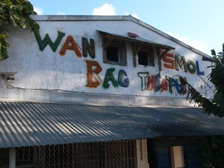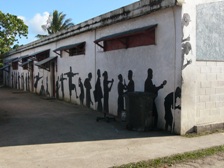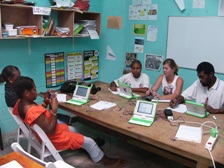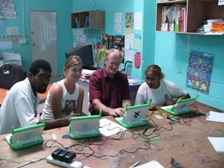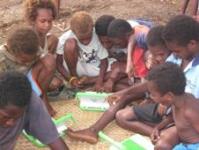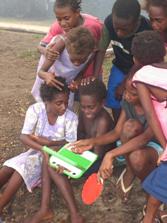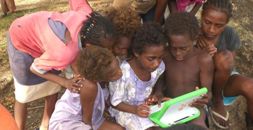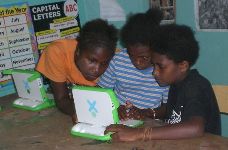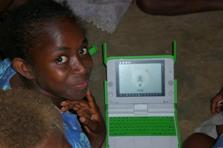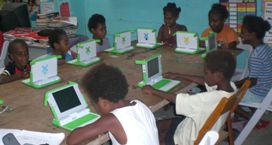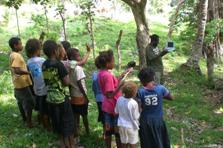OLPC Vanuatu: Difference between revisions
No edit summary |
No edit summary |
||
| Line 49: | Line 49: | ||
==Children in action== |
==Children in action== |
||
[[Image: |
[[Image:Wonsmol_Bag2.jpg]] [[Image:Wonsmol_Bag.jpg]] [[Image:Wonsmol_Bag3.jpg]] [[Image:Wonsmol_Bag4.jpg]] [[Image:Wonsmol_Bag5.jpg]] [[Image:Wonsmol_Bag6.jpg]] |
||
[[Image:Wonsmol_Bag7.jpg]] |
|||
==Progress Report Nov2008== |
==Progress Report Nov2008== |
||
Revision as of 00:28, 26 November 2008
Cook Islands -French Polynesia - Kiribati - Nauru - New Caledonia - Niue - Palau - Papua New Guinea - Samoa- Solomon Islands - Tonga - Tokelau - Tuvalu - Vanuatu
Deployments in Vanuatu commenced in July 2008 with the delivery of 25 XO laptops to Wan Smolbag Theatre Group in Port Vila. They are currently being used in literacy classes at the theatre. Plans to localize the O/S to Bislama have been put on hold due to time constraints. Contacts:
- Ian Thomson, RICS Coordinator, Secretariat for the Pacific Community (SPC) SPC
- Wan Smolbag Theatre group [1]
A localisation project is being opened on the OLPC Pootle server for Vanuatu Bislama language.
The trials are being implemented in collaboration with the Wan Smolbag community theatre group. The intention is to link the OLPC trials with the educational drama activities and produce local content for the XO.
Projects
Ministry of Education
The Ministry is organising two pilots for Vanuatu. The Education System is tri-lingual with vernacular education in Bislama, French and English courses provided for older children. One pilot will be in English, the other in French. The French pilot will link to the Haiti OLPC project which has developed resources to match the French Education System.
More information will be posted here as the projects develop.
Wan Smolbag Theatre
Wan Smolbag Theatre is a well established NGO providing education and awareness raising services in Vanuatu and around the Pacific Islands. Its principal purpose is to inform Islanders of important issues through performing plays and conducting workshops after the play. It addresses issues such as reproductive health, good governance, environmental awareness, basic literacy etc. It produces DVDs, some of performances, but mostly fully scripted films or documentaries. Their catch line is: Working with communities through drama to provide a greater understanding of development issues in the South Pacific.
Community theater brings plays to the people, plays about environmental, health, social and human rights. Wan Smolbag Theatre writes and produces a large number of plays, drama sketches, and participatory drama workshops for government agencies, NGOs and development programs.
In Port Vila, WSB has a large centre including studios and a stage where it produces the material (see photo). This centre also has a Telecentre for local youth.
At the Port Vila centre, WSB holds a drop in service for youth from the neighbouring settlement area. At any one time, there can be up to 100 children, but this varies considerably day to day, depending if the children can, or are allowed to, attend. Most of these children do not attend school, basically as their parents cannot afford the school fees. Current "Youth" members are aged from 3-57 years old and most have never attended school. The literacy programme is managed by the WSB Youth Centre with the assistance of a Kiwi volunteer, working for Volunteer Services Abroad, a New Zealand NGO. There are 3 local support staff. It should be noted that none of these staff are trained teachers and work with minimal resources, e.g. donated books from New Zealand. The training is in English as they have few Bislama resources (the local universal Pidgin language). The program is funded by AusAID and NZAID. The children are split into two groups, one of 15 five to ten year olds and the other of 10 ten to sixteen year olds. It should be noted that this is the first NGO programme with OLPC in the Pacific and it will be very important for understanding how to reach the many children that do not attend school.
The programme Wan Smolbag has been offered involves provision of 25 XOs and basic training for 5 staff. This was conducted in late July (see photos)
After the training, the staff investigated how to incorporate the laptops into their training program. It was agreed that due to the drop in nature of the program and the irregular attendance of children, the child ownership requirement would be delayed to see the impact of the laptops. The laptops will be kept in the centre initially.
Connection to the Internet will not be initially provided due to lack of funding. This will be reviewed when the impact of the laptops is evaluated
An assessment plan is being developed that will include regular reporting.
Children in action
Progress Report Nov2008
WSB has over the last 3months successful incorporated the use of the OLPC into the pikinini literacy classes, and is using these 3 times a week to explore news ways in teaching and also to encourage the children to learn, explore and take control of their own learning.
Although the children do not take their computers home, they quickly developed a sense of ownership, putting their own names on the computers and taking care to make sure their own computers are charged at the end of each day.
The laptops have also been used in our community outreach program’s, in which WSB staff go to a near by community to display clubs and activities happening in the youth centre. The laptops have received great interest, and have as a direct result seen new youth attending the literacy classes.
An assessment plan is currently being used to regularly assess the children on the basic features of the computers as well as to gain an understanding on their growing knowledge on specific program features.
